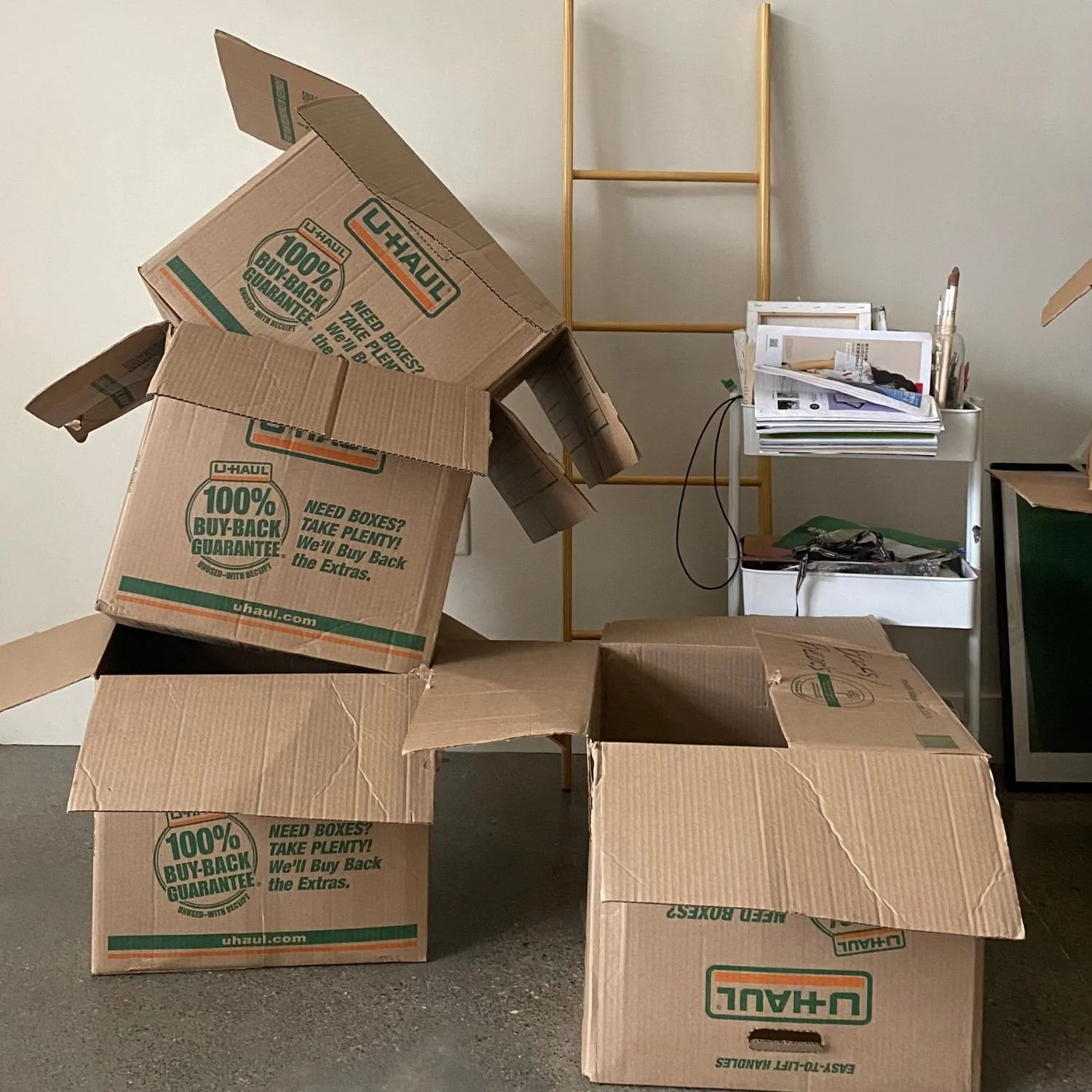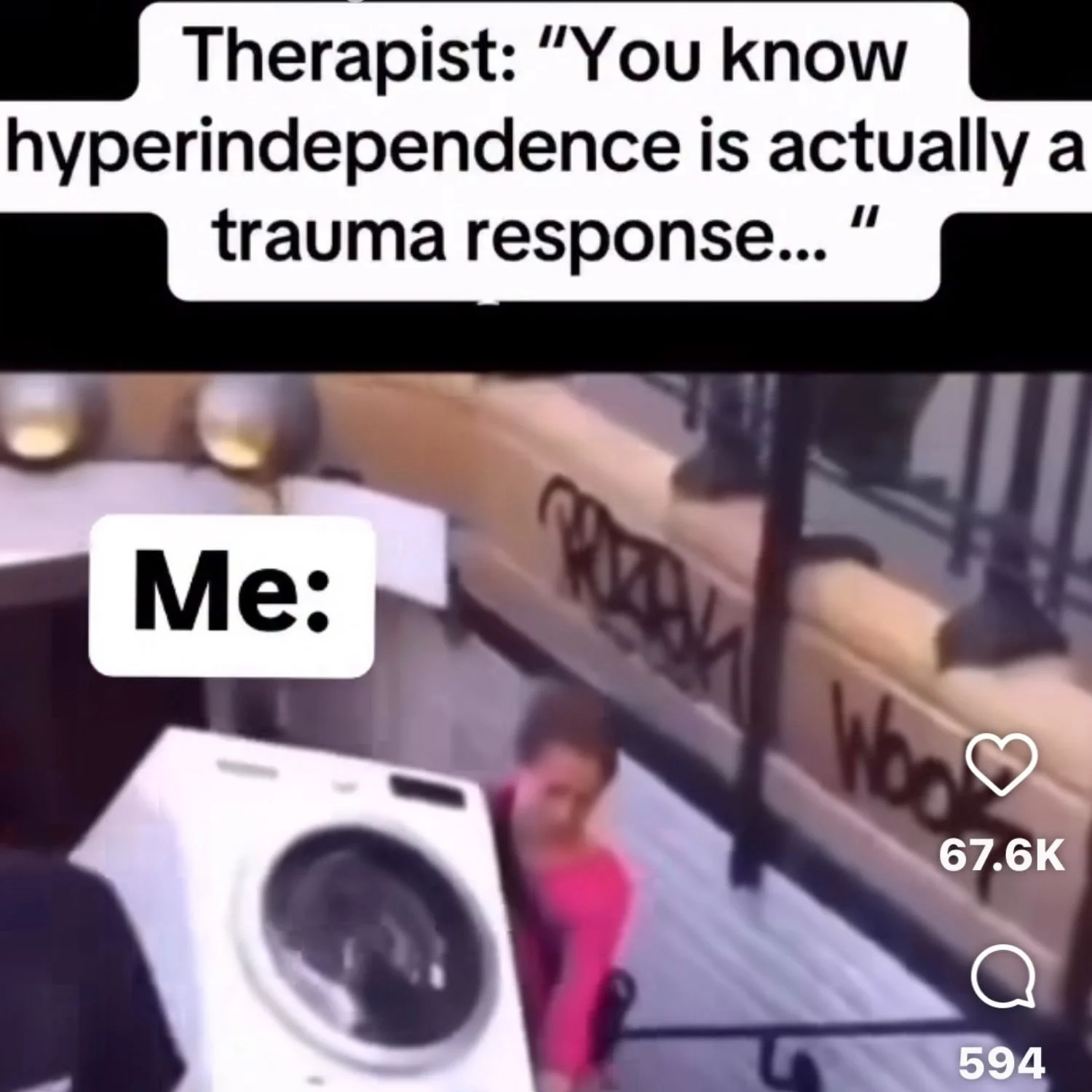Hyper-Independence: When Strength Turns Into Survival Mode
By Nicola Campbell
From packing up homes alone to navigating grief, motherhood and starting over, hyper-independence has been my default setting. But with therapy, friendship and a bit of self-care, I’m finally learning to let the armour loosen.
Last week, my friend sent me a video of a woman hauling a full-size washing machine up the steps of a subway station. No straps, no trolley, no help — just brute determination.
The caption read:
Therapist: You know hyper-independence is actually a trauma response…
Me: video of woman carrying washing machine.
My friend’s message underneath said simply: “us.”
My reply: OMG it so is.
For context, she’s my best “widow friend.” We met more than a decade ago when she read the blog I wrote after my husband died — a raw outpouring of grief, widowness, and the reality of having two children under three. Our circumstances were different, but the outcome identical: we became young widows who learned to survive by doing absolutely everything ourselves. Our friendship is stitched together with black humour, shared chaos and the unspoken agreement that we are each other’s designated “help” when we dare to let anyone into our fiercely guarded I’ve got it bubble.
Since 2012, I’ve lived in a state of near-constant hyper-independence. When Colin died, I was in London, making the decision to uproot my girls and move back to Edinburgh. I packed that house almost single-handedly. People would say, “Let me know if there’s anything I can do,” but grief leaves you unable to delegate — and even if I’d asked, I’m not sure they meant twelve runs to the dump with bin bags full of life debris.
I’ve bought houses alone. Sold them alone. Moved cities alone. I’ve made every tiny and monumental decision for my children. I’ve assembled entire rooms of IKEA furniture, always taking that helpful little diagram of two men with a tick and one man with a cross as a personal challenge.
I did marry again. Reader, it has not worked out. Was hyper-independence part of it? Possibly. But I place no blame, though my inability to rely on anyone may have suited him. The middle-aged life tests — moving my mum into a home, dismantling her house piece by piece, and ultimately packing up our home when things ended — were mine alone. At one point he did lift a wastepaper basket into the car. Hero.
Now that I’ve moved into my own place, my hyper-independence is at an all-time high. I’m rearranging walls, rooms, lugging boxes, fixing, fighting with mice — because somewhere inside me is a conviction that if I don’t do it myself, it’ll fall apart, or I will.
And here’s the truth: I’m also in therapy. I see a brilliant therapist who has the unenviable job of helping me navigate the whirling storm inside my head — grief for dead husbands, grief for second husbands or perhaps choices of, childhood patterns, hyper-independence and whatever else I throw at him in our sessions. There’s comfort in knowing I’m not expected to untangle every thread alone.
Friendships with those who get it help enormously too. The women — and the widows — who understand the silent choreography of doing it all yourself. They don’t tell you to “just ask for help.” They show up with understanding, humour, and the kind of knowing that doesn’t need words.
What Hyper-Independence Looks Like
It’s more than being “strong.” It can be:
Struggling to trust others
Feeling ashamed when you need help
Taking on far more than one human can carry
Believing every decision must be made alone
Feeling like a burden
Holding emotions so tightly they barely get air
Avoiding relying on others
Living in a permanent state of overwhelm
Often carrying anxiety, depression, PTSD or unresolved grief beneath the armour
Hyper-independence is what happens when life teaches you, over and over, that relying on others isn’t safe or sustainable.
Softening the Edges
What I’m learning — slowly, stubbornly — is that hyper-independence doesn’t disappear. But it can soften.
For me, that often looks like small, personal acts of self-care.
A long walk where my brain can unspool
Swimming lengths until the world quiets
A yoga class
Deep breaths, meditation or, my new favourite, Yoga Nidra
Eating something nourishing that isn’t a kids’ leftover
Going to bed early — or at least earlier than midnight
An hour with a book, a bath, or absolute silence
None of these “fix” my hyper-independence, but they soothe the nervous system that fuels it. They create a crack in the armour where softness can seep through. And sometimes softening looks like allowing a friend to carry one box. Sometimes it’s admitting you can’t do everything. Sometimes it’s sitting across from a therapist and letting someone else hold a thread of the chaos.
For me, hyper-independence has been a survival strategy. But survival isn’t the same as living. This next chapter — in my own home, with my own chaos — is about learning to let someone take a corner of the load, even if I still instinctively try to lift the whole washing machine myself.


